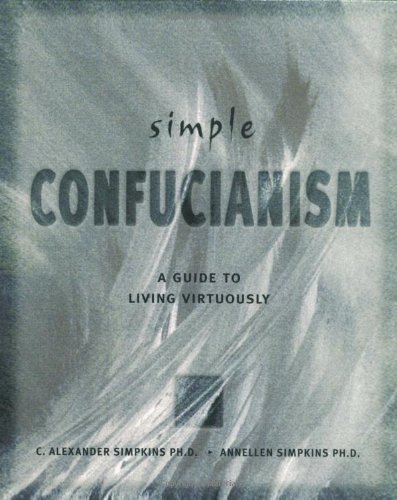Simple Confucianism: A Guide to Living Virtuously - Softcover

"synopsis" may belong to another edition of this title.
Confucius's thought was not systematic by Western standards, but that was not his goal. He was attempting to set a standard for all subsequent Confucian philosophers in China. He believed in searching inwardly, not in setting out a system to imitate. He had faith that his followers would develop the wisdom for future generations. Truth's implications are not bound by time.
Confucius addressed the problem of the human condition. He emphasized the intimate links between the Way of Heaven and the Way of Earth with the Way of Humanity. He put the world of action in social relationships at the center. Confucians point to everyday life as the focus of meditation to find enlightenment. Confucius said,
I used to devote myself to thinking, doing without food throughout the day and without sleep throughout the night. I found that the practice was without merit; the better way is to learn. (Chang 1957, 13)
Confucian Virtues Nobility is a function of how we live. What we are in character is molded by what we do. Our actions matter and can lead to social harmony, expressed in tradition, honor, and virtue. Confucius distinguished a number of virtues: humanness (jen), filial piety, loyalty, duty, sincerity, righteousness, and propriety. The most central virtue is human-heartedness, jen. This primary quality was interpreted in various ways by the generations that followed Confucius. Jen translates as true personhood, being fully human. The true self is honest, forthright, correct. These qualities are the givens of humanity. All we need to do is to be true, genuine, and sincere, and Confucius taught his students to cultivate these qualities. Virtues are action-oriented, practiced in relationship with others and in relationship to oneself, even when you are alone. To Confucius, human beings use values to guide their lives. Therefore, the wise person does not attempt to separate reality from value. "Is" includes "ought." We act toward others and our actions affect them in positive or negative ways. In the process, our actions assume value to us and others.
To the question often posed in Zen-Is enlightenment sudden or the product of gradual cultivation?-Confucius would answer: continual gradual cultivation. Everyone has the potential for being and living enlightened. But sages continually cultivate the way in everyday life and relationships, lest the light be smothered and dimmed. Immorality and insincerity are not innate. They are learned. So social influences and life's circumstances can guide us down the wrong path. Confucius taught that we can and should always return to our original, good, human nature.
This world as we live it-with our duties, family, responsibilities, and obligations-is the appropriate focus. Shu (reciprocity) expresses the Confucian version of the golden rule, sometimes called the silver rule, to not do to others what you would not have done to you. Ideals are to be found in this world, in everyday life and relationships. By not doing what is imperfect and incorrect, correctness can be found, perfection comes. Jen is a quality to be cultivated in oneself and sought in others.
"About this title" may belong to another edition of this title.
- PublisherTuttle Pub
- Publication date2000
- ISBN 10 0804831777
- ISBN 13 9780804831772
- BindingPaperback
- Number of pages160
- Rating
Buy New
Learn more about this copy
Shipping:
US$ 4.13
Within U.S.A.
Top Search Results from the AbeBooks Marketplace
SIMPLE CONFUCIANISM (SIMPLE SERI
Book Description Condition: New. New. In shrink wrap. Looks like an interesting title! 0.31. Seller Inventory # Q-0804831777

